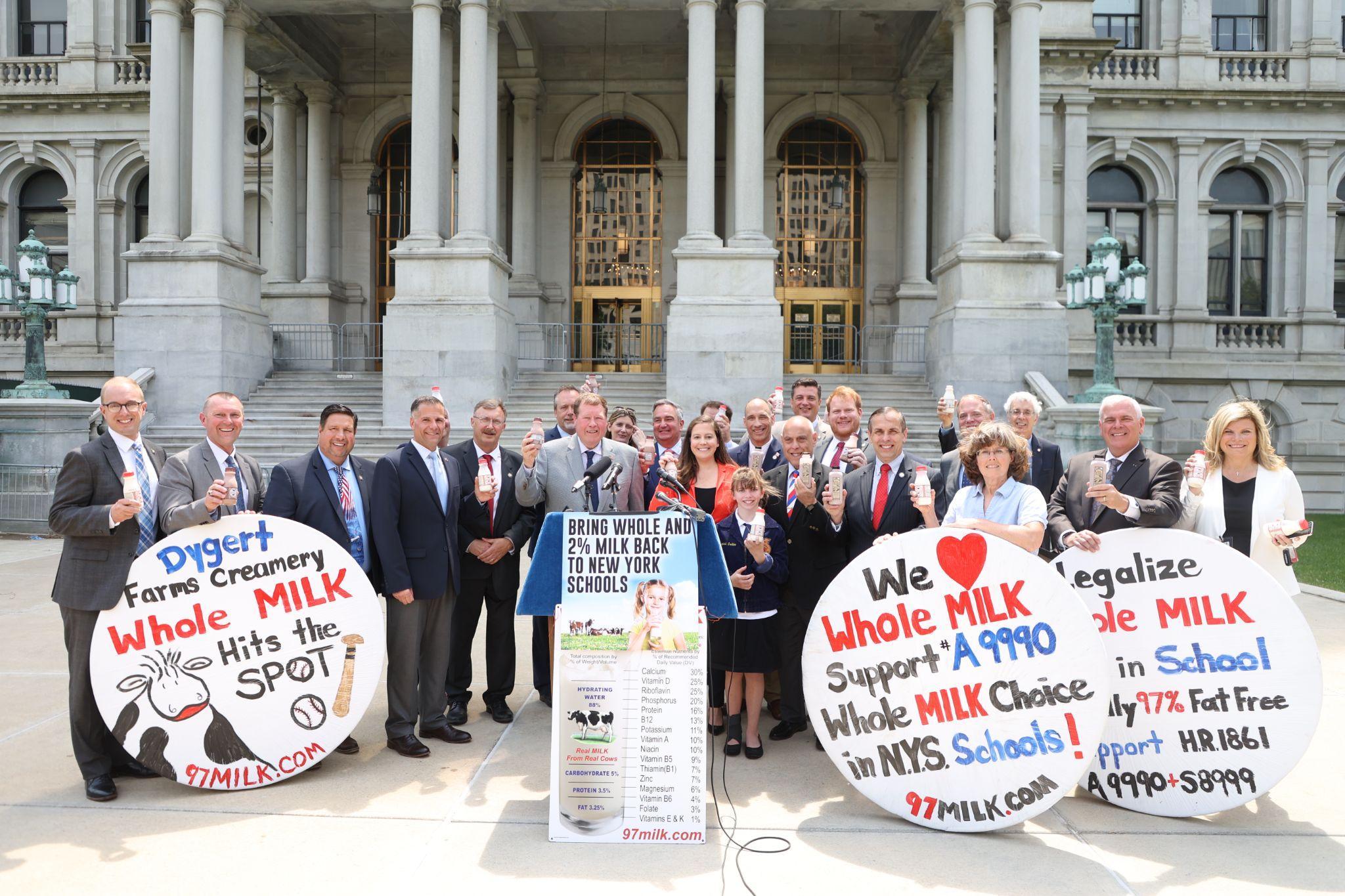Tague Holds Press Conference Urging Passage Of Bill Before End Of Session To Bring Whole And 2% Milk Back To New York State School Cafeterias
Assemblyman Chris Tague (R,C,I-Schoharie), the ranking Minority member of the Assembly Committee on Agriculture, was joined today by lawmakers such as House Minority Chair Congresswoman Elise Stefanik (NY-21), Assembly Minority Leader William Barclay (R,C,I-Pulaski), Sen. George Borrello (SD-57), Sen. Peter Oberacker (SD-51) and Dutchess County Executive Marc Molinaro, along with farmers, nutritionists, agricultural advocates and education officials for a press conference in Albany where they discussed the need to pass his bill (A.9990) to return whole and 2% milk options to New York state school cafeterias before the end of the legislative session. The bill is modeled after legislation that recently passed the Pennsylvania House.
While the federal prohibition against offering whole and 2% milk in schools was initially intended to lower rates of childhood obesity and type-2 diabetes diagnoses, childhood obesity rates and type-2 diabetes diagnoses among children have instead climbed since the removal of these milk options from cafeterias. In recent years, experts have challenged the belief held by many in the past that whole and 2% milk is less healthy than skim or 1% milk. New findings are emerging that suggest children who consume whole and 2% milk have lower risk for heart disease and type 2 diabetes, lower blood pressure, an increased satiety without weight gain and better sleep, compared to their peers who do not.
The removal of whole and 2% milk from schools has also been detrimental to farmers, who have long depended on revenue from milk sales to schools for their farms to remain viable as businesses. By passing this legislation, Tague hopes to offer support to farmers who have struggled to make ends meet in the wake of this federal prohibition, while providing students more dairy options to help them get the nutrition and nourishment their growing bodies need to succeed in an academic setting.
“Nourished students are successful students, and now more than ever we’re seeing that milk, including whole and 2% milk, is an essential component of a young person’s diet,” said Tague. “Packed with nutrients and protein to facilitate healthy growth, milk gives our kids the fuel they need to succeed in the classroom and develop into healthy adults. Keeping whole and 2% milk options out of schools only hurts our farmers and our young people, so I am urging my colleagues to help me get this done before the legislative session ends within less than a week.”
“I am proud to join my colleagues in taking a stand to allow New York state-produced whole and two-percent milk in public schools,” said House Minority Chair Congresswoman Elise Stefanik (NY-21). “Our dairy farmers in Upstate New York and the North Country work hard to produce nutritious milk for our communities, and our children deserve access to essential and delicious dairy products. I have worked on the federal level to ensure our students have access to milk choices in schools, and I’m calling on the New York State Legislature to do the same. It’s past time for New York state to lift this senseless ban.”
“The campaign to bring New York state-produced whole and 2% milk to our school lunches is gaining tremendous momentum as more people realize the importance of encouraging our children to drink milk, of any variety, so that they don’t miss out on the critical nutrients that milk provides,” said Sen. George Borrello (SD-57), ranking member of the Senate’s Agriculture Committee and sponsor of Senate Bill 8999. “While the faulty recommendations that were used to justify removing whole and 2% milk from schools more than a decade ago have since been disproven by newer research, the government ban remains in place, depriving kids of the opportunity to choose the nutritious milk of their choice and undermining the financial viability of New York’s dairy farms. We are here, standing united in our conviction that it’s time to lift this senseless ban.”
Given what we know about childhood health issues, reintroducing these choices into school cafeterias allows kids to make healthy choices for themselves,” said Dr. Timothy Mundell, superintendent for Berne-Knox-Westerlo Central School District. “It demonstrates to them how to participate effectively in a free society and get the nourishment they need to succeed throughout the day. Better nutrition makes for better performing students, so passing this bill is just a matter of common sense.”

